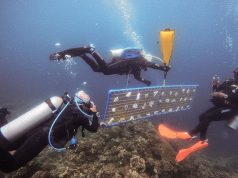
- Philippines banks on liquefied natural gas for energy
- Gas-fired power plants blamed for health issues
- Lawmakers passed law to import more natural gas
BATANGAS, Philippines (Thomson Reuters Foundation) —Residents near the Philippines port of Batangas fear five liquefied natural gas (LNG) power plants and two nearby terminals to import the fuel are causing a spate of respiratory illnesses and have appealed to the government to take action.
The government says LNG is a clean alternative to coal and the generating capacity is needed to feed the growing energy needs of the country’s main island, Luzon, also home to the capital, Manila, some 110 km (68 miles) to the north.
But many people living in Santa Clara, a settlement immediately adjacent to the port, say there has been a sharp rise in respiratory illnesses, including in children as young as five, and that the conditions are linked to the LNG plants.
“We’re worried that if they kept on building new gas plants, our health conditions will worsen, and our livelihood will suffer,” said Welita Abanil, 69, a Santa Clara health worker.
“We’re also not earning enough from fishing anymore because of the gas plants around here. But we have nowhere else to go. It’s like we’re just waiting for our deaths,” she said.
Jit Sohal, climate and health manager of Health Care Without Harm in Southeast Asia, an international coalition for climate-resilient healthcare, said methane from burning fossil gas has a warming impact 86 times stronger than carbon dioxide over a 20-year period.
“Children are particularly at high risk of developing respiratory illnesses because they had less capacity to adapt to pollutants such as methane and nitrogen oxide,” said Sohal.
Air pollution and carbon emissions from burning fossil gas also contributed to premature deaths “almost as much as coal”, according to a report by C40, a global network of some 100 mayors committed to confront the climate crisis.
The Philippines Department of Health last year launched an investigation in response to a petition by residents of five Batangas districts and several climate NGOs reporting a spike in respiratory and cardiovascular sickness.
However, Voltaire Guadalupe, who led the department’s investigation, concluded: “It is expected that people will get sick or die. But we cannot see an increase in cases, nor can we attribute these cases to the operation of power plants.”
Turning the gas on
The groups of Batangas residents now want the government to conduct a comprehensive health assessment of the impacts of the LNG plants and to stop the expansion of fossil fuel.
The country’s only commercial source of natural gas, the Malampaya field, sustains four gas plants in Batangas city, but is expected to be depleted by 2027.
However, lawmakers this month approved a measure to push for more gas exploration and expand LNG infrastructure with more LNG import terminals and more gas-fired power plants.
LNG produces less carbon dioxide than other fossil fuels, but it is mostly composed of methane, a colourless but potent greenhouse gas.
The Philippine Movement for Climate Justice, a coalition working with climate-vulnerable communities, said the law would endanger communities and contradicted President Ferdinand Marcos Jr.’s drive for more renewable energy.
Global Witness, an international NGO, said exporting fossil gas “to almost any country around the world” disguised as clean energy makes it a “looming climate disaster” that can endanger the health and safety of nearby communities.
The Philippines-based NGO, the Center for Energy, Ecology and Development (CEED), said the expansion of fossil gas use in Southeast Asia, a region rich in renewable energy, undermined states’ Paris Agreement commitments to curb emissions.
Environmentalists also fear the Philippines’ embrace of gas could endanger public health and the Verde Island Passage in Batangas, a centre for global marine biodiversity dubbed the “Amazon of the Oceans”.
A group of civil society organisations, including CEED, Greenpeace and Friends of the Earth United States, said a Japanese-financed LNG terminal in Batangas could endanger more than 300 coral species and the livelihoods of 2 million people in Verde Island Passage.
Right to livelihood
Abanil’s husband, Joseph Vargas, said he was among 200 fishers near the Batangas gas plants whose livelihoods were threatened by the facilities.
Aside from the declining fish catch due to polluted waters, Vargas said gas plant operators did not let fishing boats enter their usual fishing grounds near the gas facilities.
“The constitution says every Filipino’s right to life and security must be protected. But our livelihood depends on the environment, not the gas industry,” said Vargas, 53.
Like other residents in Santa Clara, Vargas worries about the long-term impact of the gas plants on his children.
Local officials acknowledged the dilemma of balancing the country’s energy needs and economic growth with protecting public health.
“We cannot deny that power plants had contributed to the progress of communities here,” said Andres Malibiran, head of the nearby San Isidro district.
“Fossil gas is not considered as clean gas … but we don’t have the power to oppose these developments. We just need to remind everyone that the environment should not be neglected because people’s health depends on it.”
—Reporting by Mariejo Ramos. Editing by Jon Hemming









